
BULLETIN OF THE EUROPEAN ASSOCIATION OF FISH PATHOLOGISTS
metrics 2024
Championing Excellence in Fish Health Studies.
Introduction
BULLETIN OF THE EUROPEAN ASSOCIATION OF FISH PATHOLOGISTS is a leading journal dedicated to advancing research and knowledge in the field of fish pathology, published by the European Association of Fish Pathologists. With its ISSN number 0108-0288, this journal has consistently contributed to the academic landscape since its inception in 1996. Based in the United Kingdom, this journal is recognized for its high-quality research output, holding a commendable Q2 ranking in both Aquatic Science and Small Animals categories as of 2023. The Scopus rankings further reflect its impact, notably securing a 10th rank in Veterinary Small Animals, showcasing its relevance and influence in the field. Although it does not offer Open Access, the content remains vital for researchers and practitioners invested in addressing the challenges associated with fish health and pathogens. The journal serves as a critical platform for sharing innovative studies, fostering collaborations, and informing ongoing developments in aquatic science. Its commitment to maintaining high standards ensures that it remains an essential resource for professionals, researchers, and students alike in pursuit of knowledge on fish pathology and aquatic health.
Metrics 2024
 0.43
0.43 0.30
0.30 0.60
0.60 42
42Metrics History
Rank 2024
Scopus
IF (Web Of Science)
JCI (Web Of Science)
Quartile History
Similar Journals

Fish and Shellfish Immunology Reports
Unveiling the secrets of aquatic organism defenses.Fish and Shellfish Immunology Reports is a distinguished journal published by ELSEVIER, focusing on the vital intersection of immunological responses in aquatic organisms. Established in 2021, it has quickly gained recognition for its contributions to the fields of Aquatic Science and Immunology, achieving a commendable Q2 ranking in Aquatic Science and a Q3 ranking in Immunology as of 2023. This journal is pivotal for researchers, professionals, and students, providing a platform for the dissemination of innovative research findings and critical reviews on fish and shellfish immunology. Based in the United Kingdom, Fish and Shellfish Immunology Reports remains committed to advancing scientific knowledge and collaboration in this niche yet significant area of study. The journal is indexed in Scopus, illustrating its academic credibility with rankings in both the Agricultural and Biological Sciences as well as the Immunology and Microbiology categories. Although currently not an open-access publication, it prides itself on maintaining high standards of peer review and ethical research practices.

FISH PATHOLOGY
Elevating the standards of fish health research worldwide.FISH PATHOLOGY is a vital journal dedicated to the field of aquatic animal health, published by the Japan Society of Fish Pathology. With a strong publication history dating back to 1967, this interdisciplinary journal aims to promote high-quality research focusing on the pathologies affecting fish and other aquatic organisms. Despite its category quartiles ranking of Q3 in both Animal Science and Zoology and Aquatic Science, the journal maintains a growing presence within the scientific community, holding a respectable position in Scopus rankings. Researchers and professionals looking for deep insights into fish health management and disease pathology will find FISH PATHOLOGY to be an invaluable resource for advancing knowledge and fostering collaboration in this essential area of study. Although the journal does not currently offer open access, its comprehensive analyses and findings are crucial for both academic and practical applications in fisheries and aquaculture worldwide.
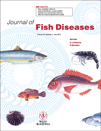
JOURNAL OF FISH DISEASES
Advancing aquatic health through innovative research.JOURNAL OF FISH DISEASES, published by WILEY, stands as a preeminent peer-reviewed journal in the fields of aquatic science and veterinary medicine. With its ISSN 0140-7775 and E-ISSN 1365-2761, this journal has been a leading platform for disseminating groundbreaking research since its inception in 1978. Recognized for its excellence, it boasts a Q1 ranking in both Aquatic Science and Veterinary (miscellaneous) categories for 2023, affirming its vital role in advancing knowledge in fish pathology and health management. The journal engages a diverse audience of researchers, professionals, and students committed to tackling fish diseases and enhancing aquaculture practices. Although it does not offer open access, the journal ensures high visibility and accessibility to key research findings that impact aquatic ecosystems and veterinary practices globally. With a commitment to fostering innovation, the JOURNAL OF FISH DISEASES continues to shape the future of aquatic health research well into its convergence through 2024.
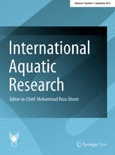
International Aquatic Research
Empowering aquatic scientists to make waves in research.International Aquatic Research, published by the Islamic Azad University, Tonekabon Branch, is a vital open-access journal dedicated to advancing the field of aquatic sciences since its inception in 2009. With an ISSN of 2008-4935 and an E-ISSN of 2008-6970, the journal plays a significant role in disseminating high-quality research findings from Iran and around the globe. It covers a broad range of topics in aquatic biology, fisheries science, and marine ecology, making it a valuable resource for researchers, professionals, and students alike. As of 2023, it ranks in the third quartile (Q3) of the aquatic science category with a Scopus rank of #138 out of 247 in Agricultural and Biological Sciences, reflecting its growing influence in the field. With a commitment to promoting scientific knowledge and fostering collaboration among aquatic research communities, International Aquatic Research is positioned as an essential platform for those dedicated to understanding and conserving marine and freshwater environments.

BOLETIM DO INSTITUTO DE PESCA
Illuminating emerging studies in aquatic sciences.BOLETIM DO INSTITUTO DE PESCA, published by the Instituto Pesca, is a Brazilian journal dedicated to advancing the fields of Animal Science and Aquatic Science. With its Open Access policy adopted in 2008, the journal ensures that research is widely disseminated, fostering collaboration and innovation among researchers, professionals, and students alike. Despite its recent Q4 category rankings in the 2023 metrics for both disciplines, the journal plays a vital role in providing a platform for emerging studies and critical discussions related to aquatic ecosystems and fisheries management. Covering a wide range of topics within its scope, BOLETIM DO INSTITUTO DE PESCA publishes original research, reviews, and case studies, stimulating academic dialogue and contributing to the sustainable management of aquatic resources in Brazil and beyond. This journal is an essential resource for anyone invested in marine and freshwater biology, ecology, and conservation.
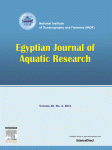
Egyptian Journal of Aquatic Research
Connecting researchers to elevate aquatic understanding.Welcome to the Egyptian Journal of Aquatic Research, a premier peer-reviewed academic journal published by ELSEVIER, dedicated to advancing the field of aquatic sciences. With a robust impact factor and recognition as a Q1 journal in key categories such as Aquatic Science and Ecology, this open access journal has established itself as a vital platform for disseminating high-quality research since its inception in 2012. The journal aims to provide comprehensive coverage of topics including ecology, evolutionary biology, and water science, making it a crucial resource for researchers, professionals, and students engaged in these dynamic fields. With Scopus rankings placing it in the top echelons of various categories, the Egyptian Journal of Aquatic Research fosters innovation, collaboration, and knowledge dissemination on a global scale, making it an indispensable asset for anyone invested in understanding and preserving aquatic systems.
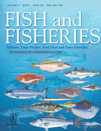
FISH AND FISHERIES
Navigating the complexities of fish and fisheries science.FISH AND FISHERIES is a premier academic journal published by Wiley, dedicated to advancing knowledge in the fields of aquatic science, ecology, and oceanography. With an impressive impact reflected in its 2023 categorization in the Q1 quartile across multiple disciplines—including Aquatic Science and Management, Monitoring, Policy and Law—it serves as an essential resource for researchers, professionals, and students alike. This journal includes rigorous, peer-reviewed articles that address the multifaceted aspects of fish biology, conservation, and sustainable fisheries management. The journal's Scopus rankings further validate its significance, with top positions in Earth and Planetary Sciences, and its commitment to fostering scientific dialogue in an era where the oceans and aquatic ecosystems face unprecedented challenges. Despite not being an Open Access journal, FISH AND FISHERIES remains a vital platform for innovative research that informs policy and drives stewardship of fish populations and their habitats.
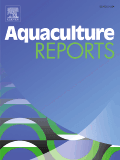
Aquaculture Reports
Leading the Way in Aquaculture Research ExcellenceAquaculture Reports, published by Elsevier, is a prominent open-access journal dedicated to advancing knowledge in the fields of aquaculture, aquatic science, and animal science. Since its inception in 2015, this journal has quickly established itself as a leading platform for high-quality research, achieving a remarkable Q1 ranking in both Animal Science and Zoology and Aquatic Science as of 2023. With a Scopus ranking placing it in the top 7% of journals in Agricultural and Biological Sciences, Aquaculture Reports serves as an essential resource for researchers, professionals, and students alike, facilitating the exchange of innovative ideas and cutting-edge findings. The journal is indexed under ISSN 2352-5134 and is committed to fostering open access, ensuring that the latest research is readily available to the global scientific community. As it converges its years of publication from 2015 to 2024, Aquaculture Reports continues to shape the future of aquaculture research through rigorous peer-reviewed articles and impactful studies.

Fishes is a premier academic journal dedicated to the exploration and dissemination of cutting-edge research in the fields of aquatic science and ecology. Published by MDPI in Switzerland, this open-access journal has been accessible to researchers globally since its inception in 2016, allowing for the rapid exchange of knowledge that fosters scientific advancement in the study of fish and aquatic ecosystems. With its convergence in the years 2016 to 2024, Fishes proudly holds a notable position in the academic community, evidenced by its category quartile rankings of Q3 in Aquatic Science and Q2 in Ecology for 2023. The journal consistently features innovative research encompassing ecological interactions, conservation strategies, and evolutionary studies within aquatic environments. By integrating interdisciplinary approaches and encouraging contributions from a diverse array of experts, Fishes serves as an invaluable resource for researchers, professionals, and students alike, contributing to the understanding and preservation of our precious aquatic biodiversity.
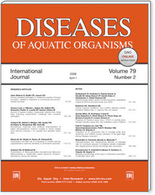
DISEASES OF AQUATIC ORGANISMS
Advancing Knowledge in Aquatic HealthDiseases of Aquatic Organisms, published by Inter-Research in Germany, is a prominent academic journal with a focus on the study and management of diseases affecting aquatic organisms, including fish, mollusks, and corals. Since its inception in 1990, this journal has been a vital resource for researchers and professionals in the fields of aquatic science and ecology, evidenced by its Q2 ranking in both categories for 2023. With an ISSN of 0177-5103 and E-ISSN 1616-1580, it offers valuable insights and advancements in the understanding of aquatic health issues and their ecological implications. Though not an open-access journal, it maintains rigorous academic standards and fosters an international dialogue on emerging pathogens and their management, contributing significantly to the body of knowledge that informs sustainable practices in aquatic environments. As the field continues to evolve, Diseases of Aquatic Organisms remains a cornerstone for those dedicated to the preservation and study of aquatic biodiversity and ecosystem health.